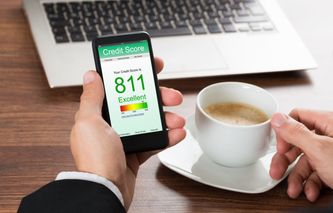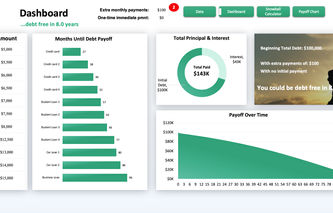What Credit Score Is Needed to Buy a Car? (Is It Really 661?)
Sweat is beading on your forehead—but you’re trying to play it cool. The salesman can’t tell you’re nervous, can he? Your credit is good enough— What if it’s not? Don’t put yourself through the above scenario—get educated before putting your dignity on the line at the car dealership.
Instead of waiting to find out what credit score is needed to buy a car, how about we dive into it now? Most sites state that you need a score of 661 to buy a car. Frankly, this is completely false. If your credit score is 660 or less—don’t worry, there are still plenty of options for you.
Similar articles:
How to Pull Your Credit Score For Free
Before we get too far ahead, you’ll first want to know your credit score. I have used Credit Karma for a decade now. It’s my absolute favorite place to check and track my credit score. Just head to their site, sign up with the necessary information—and get your Equifax and TransUnion credit scores immediately. (And don’t worry, it’s a soft pull—so it won’t negatively impact your credit score.)
What Credit Score Do Lenders Use?
Using a site like Credit Karma is pretty slick—by signing up and clicking a few buttons, you can instantly know your credit score. But is this how lenders will pull your score? What credit score is used to buy a car? This is important to know so you’re not surprised with a potentially low (and embarrassing) score at the car dealership.
What credit score do car dealerships use?
Every car dealership is different—so we can’t tell you exactly how your local dealership will pull your credit score. But, we can tell you there are mainly two methods of credit reporting that exist today—VantageScore and FICO.
VantageScore
Founded by Experian, Equifax, and TransUnion in 2006, VantageScore provides a way to measure someone’s creditworthiness. The scores range from 300 to 850—with 850 being the best. (This is the method that Credit Karma uses when pulling your credit score.)
VantageScore is becoming more popular among lenders, but is still only used about 10% of the time.
FICO Score
The FICO score is by far the most popular method to check someone’s creditworthiness—most institutions use FICO Score 8, which was first introduced in 2009.
The FICO score ranges from 300 to 850—and is still quite popular (90% of lenders use it today). So, your car dealership will likely pull your FICO score—not your Vantage Score.
How to Pull Your FICO Credit Score For Free
Since most lenders are pulling your FICO score, you’ll also want to prepare yourself with that score. How can you do this? And better yet, how can you pull your FICO score for free? You may have heard that you can pull your free credit report once a year via AnnualCreditReport.com.
While this is a great resource to see your spending history, this report won’t actually show you a score—just a report. If you want to pull your FICO score for free, head to Experian—they offer a free credit report and FICO score.
But this is also limited—you’ll only see your score from one of the three major credit bureaus. (If you have a ding in your report through TransUnion or Equifax—you won’t know.)
To get a full FICO Score 8 report and scores for all three credit bureaus, the best way to do it is through the source—myFICO.com. The cost at the time of writing is $47.85 (20% off the full price of $59.85).
What Is The Minimum Score to Buy a Car?
Is there really a minimum credit score to buy a car? (And if so, what is it?) Like we said, many sites claim that you need a 661 credit score to qualify for a car loan. This isn’t true—but where does this seemingly random number come from?
To answer this, we need to understand how lenders categorize borrowers. While numbers may differ slightly from lender to lender, below is the typical categorization of borrowers by credit score—
FICO CREDIT SCORE | CATEGORY OF BORROWER |
|---|---|
781-850 | Super-prime |
661-780 | Prime |
601-660 | Near-prime |
501-600 | Subprime |
300-500 | Deep subprime |
Did you notice the 661 score? This is the lowest possible score to stay within the “prime” lending category. If your score is 660 or less, you slip into the “near-prime” classification—which could make it more challenging for you to get a car loan.
But are people still getting car loans with a credit score that’s less than 661? According to a recent report by Experian, the answer is absolutely yes.
FICO CREDIT SCORE | CATEGORY OF BORROWER | LOAN/LEASE DISTRIBUTION |
|---|---|---|
781-850 | Super-prime | 19.57% |
661-780 | Prime | 45.74% |
601-660 | Near-prime | 18.36% |
501-600 | Subprime | 14.47% |
300-500 | Deep subprime | 1.86% |
In fact, nearly 35% of the population is getting car loans with a credit score below 661. So what is the minimum score to buy a car? Ross Breuker, a sales manager at Crown Motors, provides his insight: “There are many factors at play when someone applies for a car loan, but if we’re talking about credit scores, we like to see 650 or better. With this score, there is typically a financial institution that we’re partnered with that can fund the auto loan.”
Credit scores can be lower, but once you get below 650, the dealerships need to dig deeper to get the dollars you need. But—as you can see in the above table—if your score is less than “prime” (less than a 661 credit score), you still have a pretty decent chance of getting a car loan. You might just need to get more creative than your top-tier credit friends.
Read more:
Can You Finance a Car With No Credit?
Now we know that buying a car with bad credit is possible—but what if you have no credit? Credit Karma says it’s possible, but you’ll probably have to jump through a few extra hoops—like getting a cosigner or making a sizeable down payment.
Average Car Loan APR Based on Your Credit Score
The normal interest rate on a car loan is 5.27% for a 60-month term—this is what someone with a median credit score of 711 would expect to pay. But what about the expected interest rates for others? How do credit scores affect auto loan percentages?
Below are the typical interest rates on auto loans by credit score—
CREDIT SCORE | AVERAGE NEW CAR RATE | AVERAGE USED CAR RATE |
|---|---|---|
720-850 | 3.65% | 4.29% |
660-719 | 4.68% | 6.04% |
620-659 | 7.65% | 11.26% |
580-619 | 11.92% | 17.74% |
300-579 | 14.39% | 20.45% |
No surprises here—the worse your credit score, the higher the interest you’ll pay.
Read more:
What Is a Good APR for a Credit Card (What Annual Percentage Rates are Low, Average, and High)
Free Credit Card Payoff Calculator: Excel and Google Sheets Template
Average Interest by Credit Score for New and Used Cars
Notice how interest rates are not the same for new and used cars— With new cars, you’ll pay a lower interest rate because the lender is more certain of the car’s value—which means there’s less risk in their loan. With used cars, the value is less certain—and the lender covers this uncertainty with a higher rate.
Does this mean you should hop into a new car to save money? Not necessarily. Purchasing a new vehicle might save you $2,000 in interest payments—but it may cost you $15,000 in reduced car value over time. (Obviously not the smartest move here.) Before buying a car, be sure to buy only what you can afford—and get the best interest rate that you can.
How to Buy a Car With a Poor Credit Score
If you have a poor credit score and can’t secure a loan for a car, what other options do you have?
1. Buy with cash
I can already hear you scoffing at the thought of buying a car with cash—but it might be a great option. There are still dependable cars out there for $2,500 (I should know—I’ve driven plenty of them).
If you could save up $100 to $200 a month for a year or two, you’d have enough money to buy a car with cash. Then you’d have no car payment, you’d pay no interest—and you could get ahead rather than spinning your wheels in the debt trap.
2. Have a large down payment
Don’t have enough cash to pay for a car outright? A large down payment might be enough.
With a hefty down payment, a car dealership might be comfortable giving you a small loan to cover the difference—their exposure will be less since they’ll have most of the funds upfront.
3. Get a cosigner
If you have a friend with good credit who will cosign on a car loan with you, this will likely be enough to get you into that ride you’ve been drooling over. Be careful with this, though. If you can’t pay the loan, the lender will go after your friend and ding their credit.
This scenario has ended many friendships—so either be meticulous about making your payments, or choose a friend you wouldn’t mind losing if things go south (I'm only somewhat joking here).
4. Get a personal loan
If the dealership doesn’t give you an auto loan, perhaps your bank or credit union will grant you a personal loan. These often come with better rates than car loans—so it could be a win-win. It’s worth asking the question!
5. Find a dealer that specializes in subprime lending
New car dealerships rarely loan to subprime customers—but there are likely used car dealerships in the area that do. Ask around and you’ll likely find dealers that will lend you the money.
6. Pay a high APR
If you have trouble getting a car loan for a reasonable interest rate, you might need to bite the bullet and pay a higher APR (Annual Percentage Rate).
Should I wait to buy a car?
If no dealerships loan you money to buy a car—you may need to step back and ask yourself this question. Maybe it’s just not the right time for you to buy a car. You might have to get creative for a while, until you can save up a big down payment (or buy a car with cash).
There’s no shame in waiting—and honestly, it might be the best long-term option for you.
How to build your credit
Throughout this whole process of understanding what it takes to get a car loan, you may realize that you need to build your credit. There’s no magic secret to doing this. It mostly comes down to basic money management—
Pay your bills on time.
Stick to a budget.
Reduce your debt load.
Review your credit reports, and dispute items that aren’t yours.
If you’re interested in paying down debt, I highly recommend our debt snowball payoff tool. It has helped thousands of people plan, attack—and pay off their debts in full!
Key Takeaways
First, you don’t need a 661 credit score to get a car loan. You might qualify with a sub-500 credit score. If you’re in the market for a car and need a loan, take these steps:
Pull your credit score with Credit Karma to get an idea of where you stand.
If you’re still concerned about your actual FICO score—pay for the full reports at myFICO.com.
Talk with the dealerships in your area about your credit score, and if they can give you a loan.
If you’re having trouble getting a loan—try improving your odds by saving a large down payment, getting a cosigner, or getting a personal loan from your bank.



.jpg)


